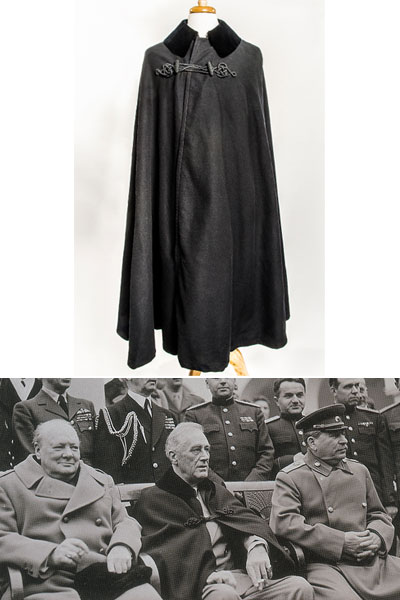High Hopes of Eleanor, FDR’s Cape & Fala
A defining element of his image, the cape projected an aura of power and strength to the public at large—a subliminal invocation of the emergent superhero and nod to the kings of old—allowing Roosevelt, afflicted with polio-induced paralysis from the waist down and confined to a wheelchair, to command the respect of the nation and world as it faced its greatest challenges of the century.
I don’t want to see a single war millionaire created in the United States as a result of this world disaster.
Presidential press conference (May 21, 1940), when America entered WWII
Excellent Bio 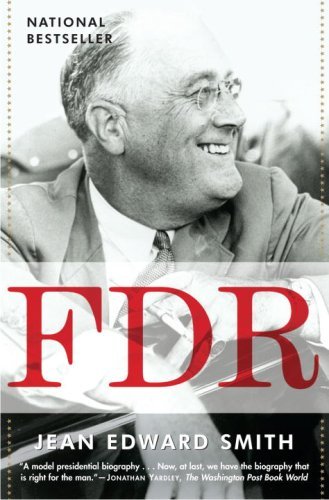
Book report from Agog –FDR-Depression Shock
FDR served as undersecretary of the Navy during the Wilson presidency and WWI, giving FDR a unique insight into the workings of government in Washington and of the workings of the military and armaments industry. This experience was invaluable in his subsequent political career and his preparation to act as Commander in Chief during WWII. Unlike Lincoln in the civil war, FDR made hardly a misstep in selecting his military commanders in WWII.
Confirming the TV movie Warm Springs , FDR’s struggle with polio, discovery of Warm Springs Georgia, and meeting for the first time, the poor of America and particularly rural southern America resulted in a dramatic change in his perceptions and empathy with the struggling poor. Without his polio and Warm Springs, it is doubtful FDR would have conceived and implemented the far reaching changes underlying the New Deal. (Excerpt)
The money changers have fled from their high seats in the temple of our civilization. We may now restore that temple to the ancient truths. The measure of the restoration lies in the extent to which we apply social values more noble than mere monetary profit.
First Inaugural Address (4 March 1933).
Click to see large 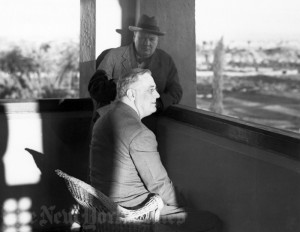
photo via
Churchill and Roosevelt met and it was here that they agreed upon only accepting “unconditional surrender” from the Axis powers. At the end of the conference, Roosevelt was anxious to get home, but Churchill begged and convinced him to take some time off to go visit Marrakech. Churchill said “You cannot come all this way to North Africa without seeing Marrakech. Let us spend two days there. I must be with you when you see the sun set on the Atlas Mountains.”
They made the 150-mile journey with the road lined with American soldiers cheering them on. Staying at the Villa Taylor, which was owned by the wealthy American socialite Mrs. Moses Taylor, Churchill convinced Roosevelt to view the sunset from the top of the famed Berber tower. The President’s personal assistants, making a chair with their crossed arms, carried him to the top. Roosevelt was so taken with the scene from the tower; he exclaimed to the Prime Minister “I feel like a sultan, you may kiss my hand my dear.”
(See Churchill’s Painting, his gift to FDR ” )
No presidential pet was ever publicized more than FDR’s beloved pet Scotty, Fala. Fala was given to Roosevelt as a Christmas gift in 1940 by his cousin, Daisy. His original name was Big Boy, but Roosevelt changed it to Murray the Outlaw of Falahill. This was shortened to Fala. Fala frequently traveled with FDR and the president ordered that only he could ever feed his beloved dog. Fala was to outlive FDR by seven years, dying in 1952. He was buried alongside the president and a statue of him with FDR is featured in Washington DC’s Franklin Roosevelt Memorial. He is the only presidential pet so honored.
Born on January 30, 1882, FDR was nameless for the first seven weeks after his birth.
FDR was a C student at Harvard
Franklin 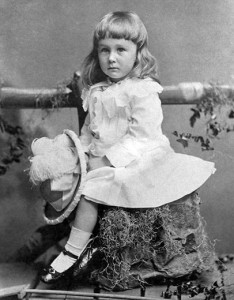
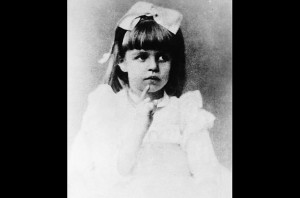 and Eleanor
and Eleanor
Why was Franklin dressed as a girl?
* Frank Sinatra claimed that he named his son Frank Sinatra Jr. not after himself, but after FDR. Frank’s full name is Franklin Wayne Emmanuel Sinatra.

